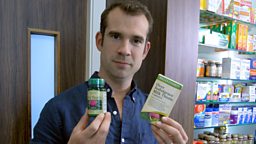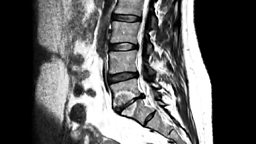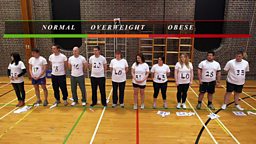Should I take vitamin supplements?
Dr Chris van Tullekan sets out to find out whether we should all be taking vitamin supplements or not.
It’s a market worth three quarters of a billion pounds in the UK, but if we add to our normal diet with supplement pills, does it actually do us any good?

Chris takes a multivitamin pill and then collects his own urine for 24 hours before visiting Professor Bill Fraser and his team at the University of East Anglia. After analysing the pill, Chris’ blood and his urine, the team can tell exactly what is happening to the vitamin C from the pill that he took. It turns out that even on his pretty average diet, Chris was already so full of vitamin C that he was peeing it out before he even took the multivitamin – and taking the pill just meant he had to pee out more.
There are two types of vitamin: water soluble (like vitamin C and the B vitamins), and fat soluble (like vitamins A & D). If your body already has enough of the water soluble vitamins, then when you take more, they are just filtered straight out into your urine. You can’t ‘boost’ your vitamin levels past ‘enough’. With the fat soluble vitamins, they are stored in your fat and places like the liver, and if you take a large extra dose you can actually overdose on them, so they are usually found in much smaller quantities in vitamin pills.
A study by the Food Standards Agency recently showed that the average Briton gets all their recommended daily allowance of every dietary vitamin from their normal food and drink. And if you already have enough of each vitamin in your body, and taking supplement vitamin pills cannot give you a ‘boost’ or give you any health benefit.
There are a few important cases where vitamin supplements can be useful, though: growing children between 6 months and 4 years old should take vitamins A, C & D. Very strict vegetarians may need supplementary vitamin B12, and those who are pregnant or breastfeeding should also consider supplements – especially vitamin D and folic acid.
Vitamin D is rare in our diet, and is formed in the body when we are exposed to sunlight, and in the UK many of us are not getting enough so the elderly and housebound should consider it as well as young children and those pregnant and breastfeeding.
If you are considering taking supplements, then do talk to your doctor for advice – because you could otherwise just be wasting your money.
We contacted the Health Food Manufacturers Association and they said this about our vitamin test:
“While these results would be expected in someone with a good vitamin C intake, this may not be the case for all UK citizens. Vitamins and minerals are essential for good health and wellbeing. For most, the best solution is to eat as healthy a diet as possible, combined with other health-related lifestyle changes. Daily vitamin supplements also provide important nutritional insurance for millions of users looking to safeguard their nutritional intake.”















































































